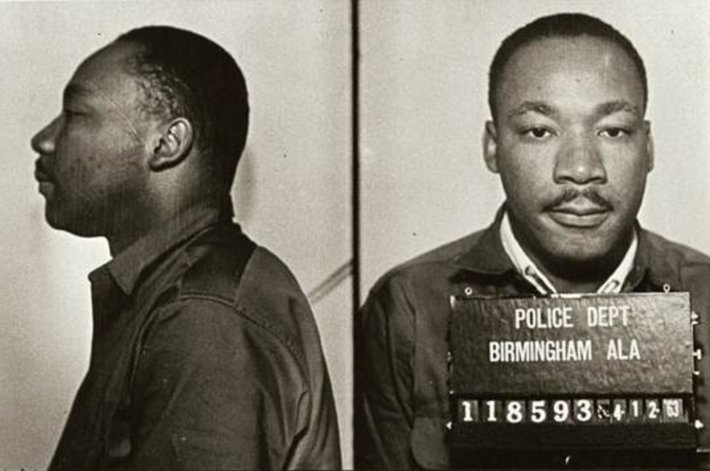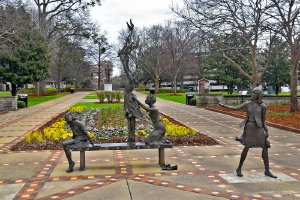In 1963, Dr. Martin Luther King Jr. was jailed and held in solitary confinement for eight days along with other organizers of the Good Friday nonviolent protest. Their purpose was to draw attention to intolerable and unchanging conditions in Birmingham, Alabama.

Eight local Christian and Jewish religious leaders published an open letter in the local newspaper. Not only did they fail to come to the aid of their fellow clergymen who had put their own safety and lives on the line, they also rebuked Dr. King. They counseled him to wait. They labeled King an outside agitator and condemned his actions as against the law.
"Seldom, if ever, do I pause to answer criticism of my work and ideas,” King wrote in his response to them, the now-famous “Letter from a Birmingham Jail.” He acknowledged the clergy as “men of genuine goodwill.” He believed that their opinions were “sincerely set forth.” But he expressed his disappointment for their failure to uphold moral justice despite the compelling need for continuing acts of nonviolent civil disobedience to accomplish equal rights for the city’s black community.
“Nonviolent direct action seeks to create such a crisis and establish such creative tension that a community that has consistently refused to negotiate is forced to confront the issue,” wrote King. “It seeks so to dramatize the issue that it can no longer be ignored… I guess it is easy for those who have never felt the stinging darts of segregation to say ‘wait.’ But when you have seen vicious mobs lynch your mothers and fathers at will and drown your sisters and brothers at whim; when you have seen hate-filled policemen curse, kick, brutalize, and even kill your black brothers and sisters with impunity… then you will understand why we find it difficult to wait.”
Rather than lash out at them personally, he wrote. “You deplore the demonstrations that are presently taking place in Birmingham. But I am sorry that your statement did not express a similar concern for the conditions that brought the demonstrations into being. I am sure that each of you would want to go beyond the superficial social analyst who looks merely at effects and does not grapple with underlying causes.”
“I must honestly reiterate that I have been disappointed with the church. I do not say that as one of those negative critics who can always find something wrong with the church. I say it as a minister of the gospel who loves the church, who was nurtured in its bosom, who has been sustained by its Spiritual blessings, and who will remain true to it as long as the cord of life shall lengthen.”
The clergymen described King’s actions as “unwise and untimely” and as violating the law. King responded: “A just law is a man-made code that squares with the moral law, or the law of God. An unjust law is a code that is out of harmony with the moral law. To put it in the terms of St. Thomas Aquinas, an unjust law is a human law that is not rooted in eternal and natural law. Any law that uplifts human personality is just. Any law that degrades human personality is unjust.”
“An unjust law is a code that a majority inflicts on a minority that is not binding on itself. This is difference made legal. On the other hand, a just law is a code that a majority compels a minority to follow, and that it is willing to follow itself. This is sameness made legal.”
“Oppressed people cannot remain oppressed forever,” he told them. “The urge for freedom will eventually come.”
Dr. King shares with them “the strange feeling when I was suddenly catapulted into the leadership of the bus protest in Montgomery several years ago that we would have the support of the white church. I felt that the white ministers, priests, and rabbis of the South would be some of our strongest allies. Instead, some few have been outright opponents, refusing to understand the freedom movement and misrepresenting its leaders; all too many others have been more cautious than courageous and have remained silent behind the anesthetizing security of stained-glass windows.”
He then ends the letter with an appeal to their understanding: “If I have said anything in this letter that is an understatement of the truth and is indicative of an unreasonable impatience, I beg you to forgive me. If I have said anything in this letter that is an overstatement of the truth and is indicative of my having a patience that makes me patient with anything less than brotherhood, I beg God to forgive me.”
The entire letter is available through the website of the California State University of Chico California.
Were he still alive, Martin Luther King Jr. would have been 93 today. A great deal has changed in no small part because of his work and sacrifice. A great deal more needs to change.
To really understand the purpose of Dr. Martin Luther King Jr. Day of Service, and to be reminded of the genius of the man, read Dr. King’s “Letter from a Birmingham Jail” in full.
______________
The Church of Scientology publishes this blog to help create a better understanding of the freedom of religion and belief and provide news on religious freedom and issues affecting this freedom around the world.
The Founder of the Scientology religion is L. Ron Hubbard and Mr. David Miscavige is the religion’s ecclesiastical leader.
For more information, visit the Scientology website or the Scientology TV network.


